http://civilwarbummer.com/moduless.php 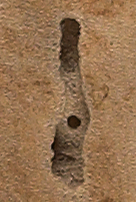 The Voynich manuscript has quite a few holes and “worm trails” from some kind of infestation that appears to have especially affected the outer pages (possibly because the pesky critters preferred the mmmm, mmmm good-tasting binding over the inner pages). I like to think of the one on folio 1r (right) as the portal to the medieval dimension.
The Voynich manuscript has quite a few holes and “worm trails” from some kind of infestation that appears to have especially affected the outer pages (possibly because the pesky critters preferred the mmmm, mmmm good-tasting binding over the inner pages). I like to think of the one on folio 1r (right) as the portal to the medieval dimension.
buy smart drugs uk modafinil In middle ages terminology, “worms” was a catchall word for things that make you sick, much as we use the word “germs” today, except that medieval “worms’ had superstitious associations because “germs”, as we see them through microscopes, weren’t yet discovered.
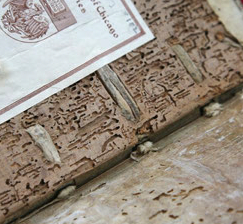
A worm-riddled manuscript cover in the Chicago University library. Detail of photo courtesy of CU and Melina Avery.
“Worms” also referred to the little wiggly things that infested medieval folks, such as lice, ringworm, round worms, pin worms, and some really nasty worms I’d prefer not to list. And then there are worms that like to gnaw through books, such as silverfish and various kinds of beetles.
Worm trails can make it particularly difficult to interpret parts of a manuscript that have been eaten away, especially if the text is small and faint. Worm trails are very intricate shapes and can sometimes look like letter forms, which makes small surface nibbles hard to distinguish from real letters.
Making Sense of the Columns
On folio 1r, on the right-hand side, there are three columns of letters and a few shapes that somewhat resemble the “red weirdos” on the same page. The first column appears to be the alphabet in Latin characters. The second column doesn’t follow an alphabetic pattern and may have been someone’s attempt at decoding the manuscript with a substitution code. The third column is faint and doesn’t appear to have as many characters as the others.
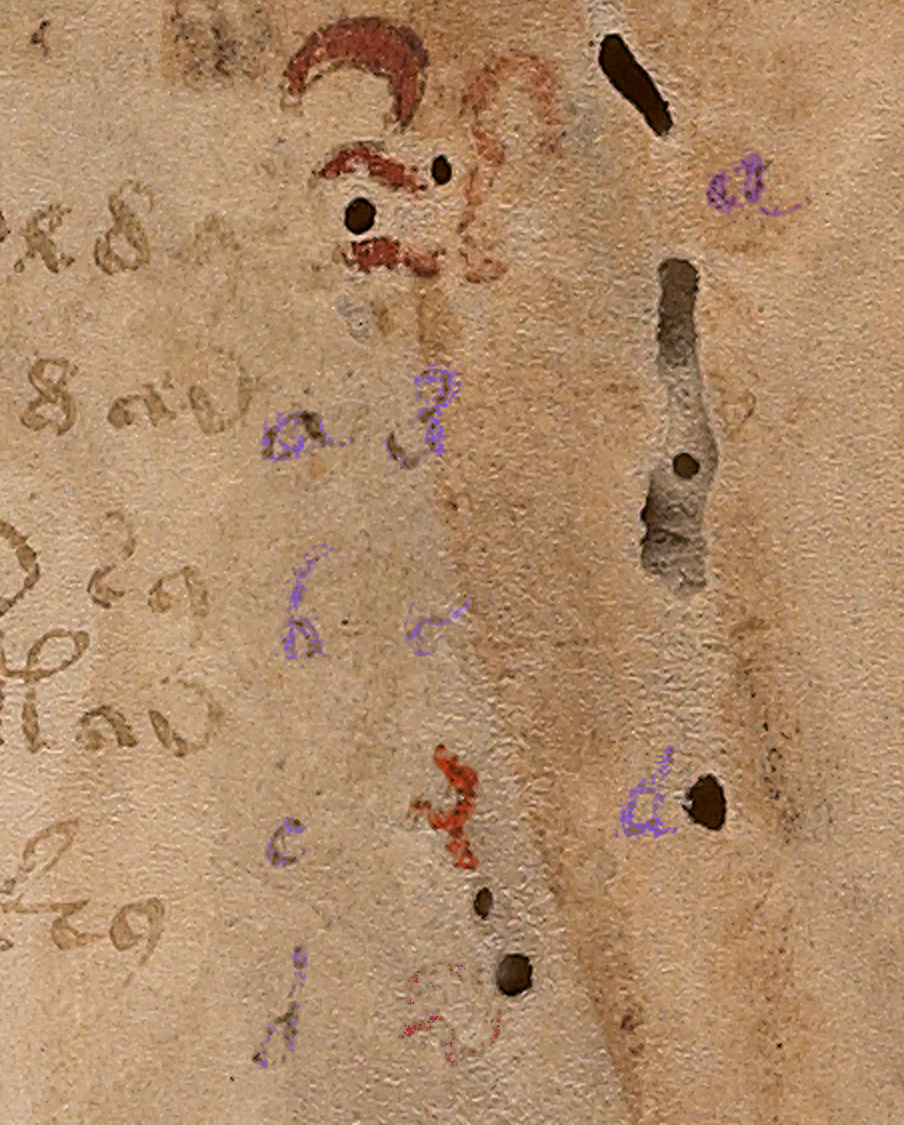 I had considerable difficulty trying to determine which marks were worm marks, which were variations in the parchment, which were chemical abrasions, and which were letters or other glyphs, but I did my best to colorize the forms so they can be more easily seen.
I had considerable difficulty trying to determine which marks were worm marks, which were variations in the parchment, which were chemical abrasions, and which were letters or other glyphs, but I did my best to colorize the forms so they can be more easily seen.
This is a very subjective process based only on scans, since I have never seen the original document, but I thought it might be helpful or at least of interest. I used a different color for the two shapes that look more like “red weirdos” than the other letters (the upper one, at least, the one that resembles a Y shape and is next to the “c”, looks like it was filled with a brush rather than a pen).
I asked myself what would motivate a person to scrape or chemically remove the columns on the right? The two most likely explanations seemed to be 1) to hide the original code or 2) to remove an unsuccessful attempt at decipherment.
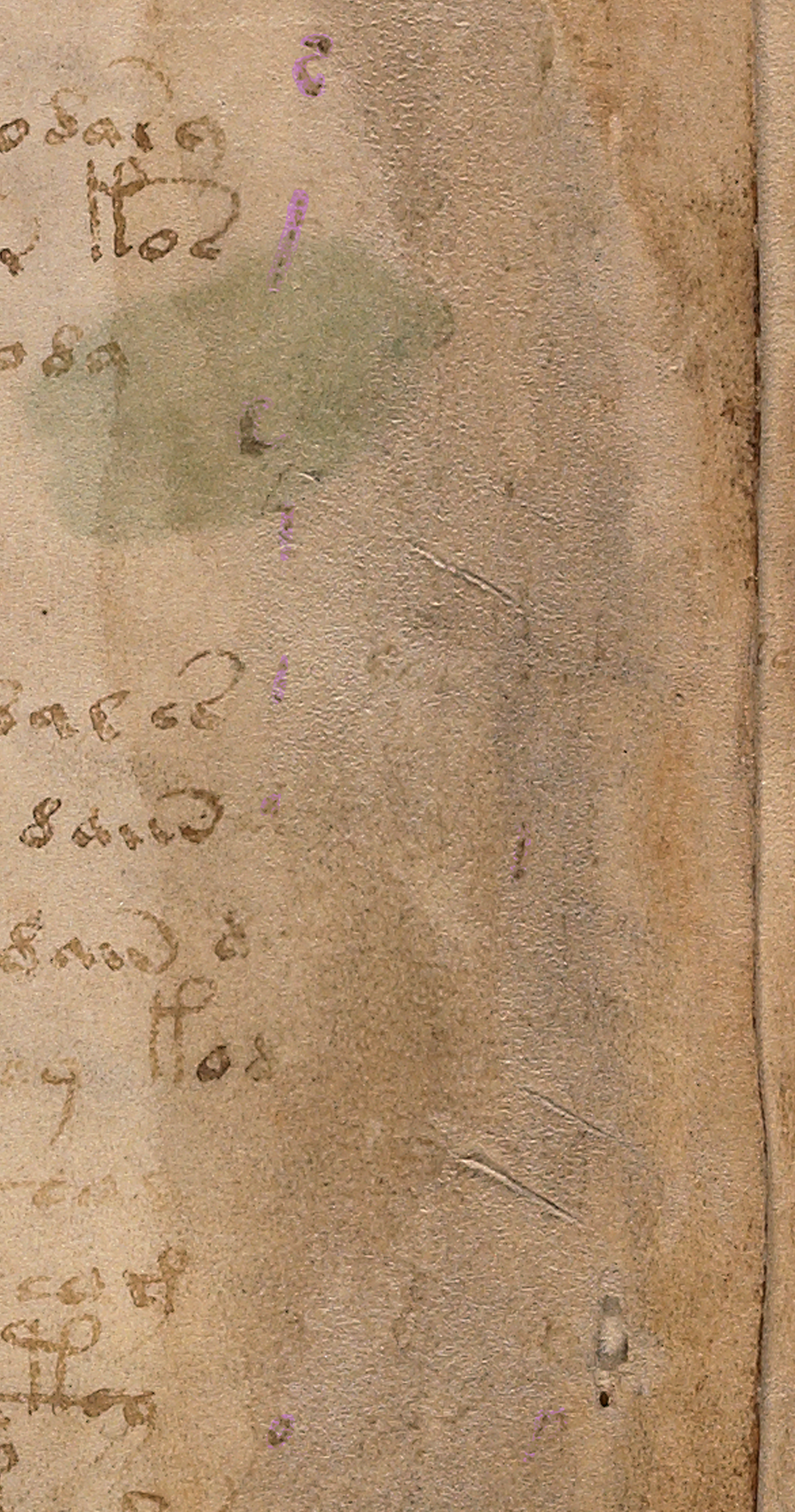 Since the column script doesn’t match the handwriting for the marginal notes or the zodiac labels, and has a different look and feel than the original VMS text, I’ve been assuming for now that it was written by someone else and may be a failed attempt at decipherment. The problem with this idea is that some of the shapes in the second column are not regular shapes in the VMS and the Y shape that resembles a red weirdo may have been part of the original document, considering there’s an oddly placed red weirdo above it. Is it possible there were shapes in the margin before the columnar text was added?
Since the column script doesn’t match the handwriting for the marginal notes or the zodiac labels, and has a different look and feel than the original VMS text, I’ve been assuming for now that it was written by someone else and may be a failed attempt at decipherment. The problem with this idea is that some of the shapes in the second column are not regular shapes in the VMS and the Y shape that resembles a red weirdo may have been part of the original document, considering there’s an oddly placed red weirdo above it. Is it possible there were shapes in the margin before the columnar text was added?
The age of the column text is difficult to determine. The ink appears to be old, but the style is not Gothic cursive, as are the marginal notes. Gothic cursive was especially prevalent in the 15th century, which suggests that the marginal notes might be as old as the VMS, or almost as old, but the columnar text is different—it could range from about the 16th century to perhaps the 20th century, depending on the region. If I were forced to guess, I’d probably guess late 16th or 17th century.
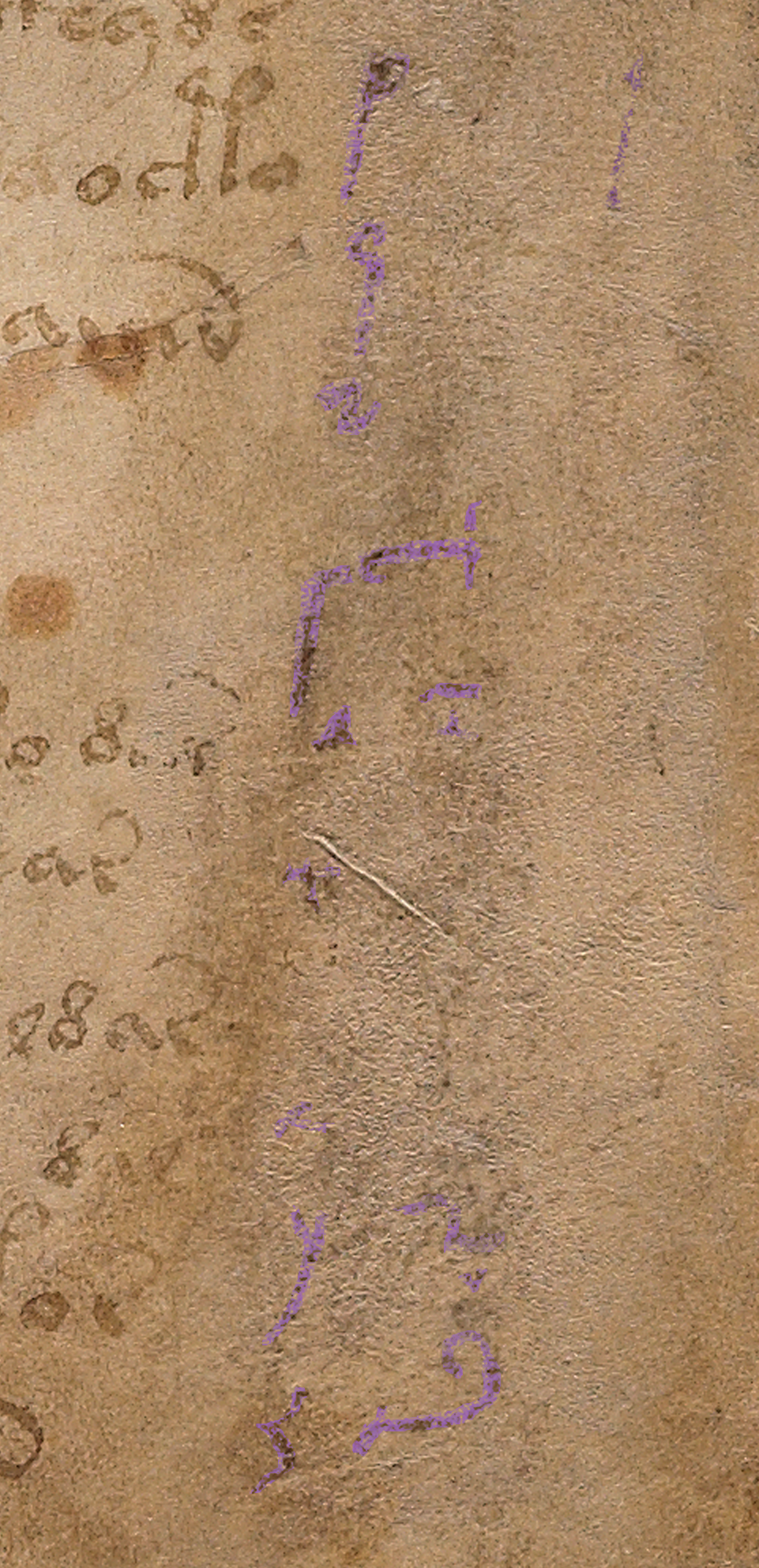 You might notice something interesting toward the bottom of the second column—the shape at the bottom is rounder and more elaborate. It’s difficult to tell if it was written at a different time or by a different hand (or whether the column writer switched to a different style of writing, which seems less likely). To the left of it, in the first column, are a pretty standard y and z and possibly an x above the y, but it’s very faded and hard to tell. Above the curly letter in the second column is a shape I can’t make out.
You might notice something interesting toward the bottom of the second column—the shape at the bottom is rounder and more elaborate. It’s difficult to tell if it was written at a different time or by a different hand (or whether the column writer switched to a different style of writing, which seems less likely). To the left of it, in the first column, are a pretty standard y and z and possibly an x above the y, but it’s very faded and hard to tell. Above the curly letter in the second column is a shape I can’t make out.
A Little Dessert
I have one more image that strikes me as interesting. It was difficult to adjust the colors because it’s very small.
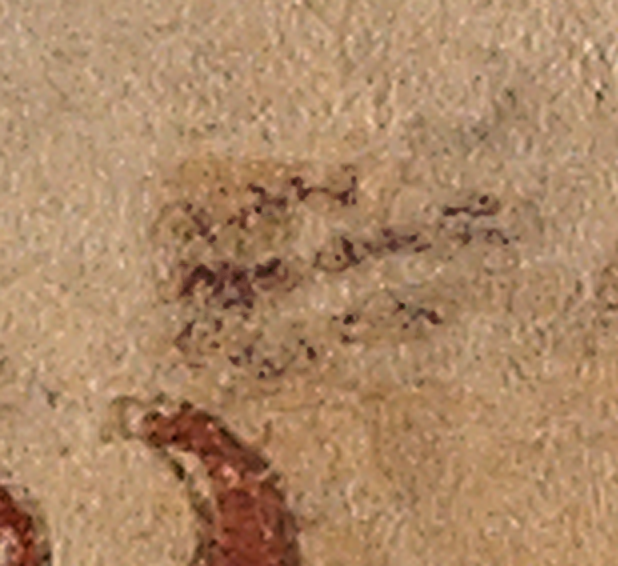 If you turn your head to the left next to the top right weirdo, there are three lines of what look like erased text. Nothing is clear except perhaps the shapes at the end of the second line, which look a bit like a modern era capital-F followed by an a (or maybe a g), but it’s scrawly, so I really can’t tell. It doesn’t look like Arabic, Hebrew, or any other language I recognize. The problem with identifying scrawls is that there are some shapes, like n or r, that look like letters in many languages (Anglo-Saxon, Latin, Greek, Hebrew, Italian, German, French, and many others) even if they mean something different in another language.
If you turn your head to the left next to the top right weirdo, there are three lines of what look like erased text. Nothing is clear except perhaps the shapes at the end of the second line, which look a bit like a modern era capital-F followed by an a (or maybe a g), but it’s scrawly, so I really can’t tell. It doesn’t look like Arabic, Hebrew, or any other language I recognize. The problem with identifying scrawls is that there are some shapes, like n or r, that look like letters in many languages (Anglo-Saxon, Latin, Greek, Hebrew, Italian, German, French, and many others) even if they mean something different in another language.
The VMS has gone through many hands, so who knows who may have added notes. Why the note would be so tiny is a bit of a puzzlement. Maybe you can make it out.
J.K. Petersen
© Copyright 2016 J.K. Petersen, All Rights Reserved
